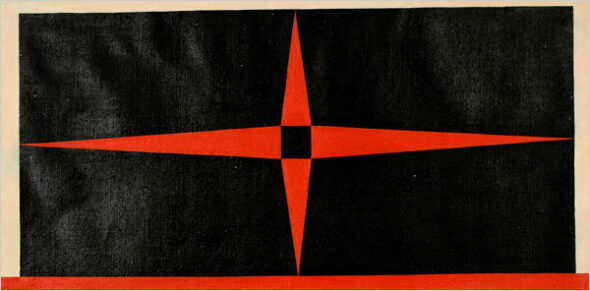

"Red Star," Carmen Herrera, 1949. The artist is a Cuban-born painter who is still active, as of 2020, at the age of 105. (Via Wikiart)
First Lines — Heart of compassion
- Published: June 18, 2020
Amid the turmoil on Earth, have you looked at the stars?
The night sky is a kind of book, or dream, or poem — there for the reading. We’ve inherited the images from the Greeks and others, and they don’t change, not in our human lifetimes. But they do move. The night sky sweeps over us, or so it seems, and different parts of the sky become prominent with different seasons, adding layers of departure and return.
Villager Tim Morand is a stargazer. He’s also an optometrist and poet, vocations of vision. He’s been writing poems for many years — haiku, sonnets and free verse poems. And sometimes poems write him! “There’s an element of letting go and letting spirit manifest,” he observed. He writes poems because they teach him things. Like a Japanese koan, or spiritual riddle, poems hold in the puzzle of their being an understanding that is utterly clear.
Tim contributed this month’s poem, “Red Antares.” He began it last fall, then returned to it in mid-March, as the coronavirus pandemic entered Ohio. His poem grew in new ways in response to the pandemic, and its confluence with the spring equinox. In star terms, the spring equinox initiates a shift between Orion, the constellation of winter, and Scorpius, the constellation of summer. At the moment of equinox, these constellations are held in balance. Then, as we tip toward summer, Orion “flees” the sting of Scorpius.
Tim uses these stars, and these ideas, to compose a poem that meditates on opposites, balance and the metaphoric resonance between movements in the skies and movements here on Earth.
Red Antares
Mercy, mercy came to us,
a song from Beatles of the earth
to foil the ill that plagues the breath,
“Across the Universe.”
They travel round and round in verse,
tales of life in sky and death:
perhaps there’s John and George in this?
Orion stung by Scorpius,
a timeless tale of equinox,
of summer rising in the east
and stars of winter lost.
Balance brought to right the fight,
a change to equal night and light,
ignoring and restoring me.
Mercy sees too many stars
can cloud the pieces of this verse,
for feeling hunger for the soil
abides in less than full.
Hearts of valor, pangs of love,
they shine in red in Scorpius,
concealing and revealing me.
There’s no word for pragna,
Om
Antares beats beneath my skin,
Antares beats beneath my skin.
—Tim Morand
The poem invokes the Beatles’ song “Across the Universe,” and carries some of its strange, spacious music. Listen to that song again. Then return to Tim’s poem, and let your ears find the correspondences. In both pieces, words rise and fall, part and join. And there are several explicit echoes — “ignoring and restoring” and “concealing and revealing” riff on “possessing and caressing” and “inciting and inviting” in the Beatles’ original.
What is Antares? It is the red star at the center or heart of Scorpius, one of the brightest stars in the sky. Antares is a symbol of compassion, Tim explained, an intriguing paradox as this “heart” is lodged in a creature that stings or repels.
What do the stars teach us? Maybe, in an unexpected way, about mercy. Remember that mercy is a special sort of compassion, granted by an entity or person powerful enough to withhold it. Mercy is mercy only because it could be otherwise. The stars of the Greeks locate the heart inside a shunned creature of pain. Perhaps we need this pain to come into contact with the mercy that exists — not out there, in the all-powerful universe — but in here, under our very skin.
“Antares beats beneath my skin. / Antares beats beneath my skin.”
I hear the closing lines as a chant or murmur, a blessing. The poem moves dramatically from the contemplation of the cosmos to the insight that the cosmos is also within us. That movement, tied to breath, tied to “pragna,” or consciousness, makes this poem feel very intimate. I sense the poet is discovering something as he writes the piece. And I discover something, too.
Beneath my own skin.
*This column originally appeared in the June 11 issue of the News. To read other First Lines poetry columns, visit the archive page here.
2 Responses to “First Lines — Heart of compassion”
The Yellow Springs News encourages respectful discussion of this article.
You must login to post a comment.
Don't have a login? Register for a free YSNews.com account.











This one I’ve been working on. Changes may happen; as they say “a poem is never really finished…only abandoned.”
“This is What Happens to Us”
Do you remember
once a child
that sudden realization
of growing old?
Barbwire descending
intent on embracing
piercing, ministering
sudden truth
An old couple
sipping tea
sharing the same
booth in the
five and dime
leaving an imprint;
an echo
that followed me
all the way home.
I’m not much of a stargazer any longer because of arthritis in my neck; however, “Thank you” for the inspiration and letting me know they’re still there : )
Years ago I published several pieces in this journal
https://openmindsquarterly.submittable.com/submit
They still accept submissions. Your poetry column and WYSO’s Conrad’s Corner have inspired me to give writing poems a second look.